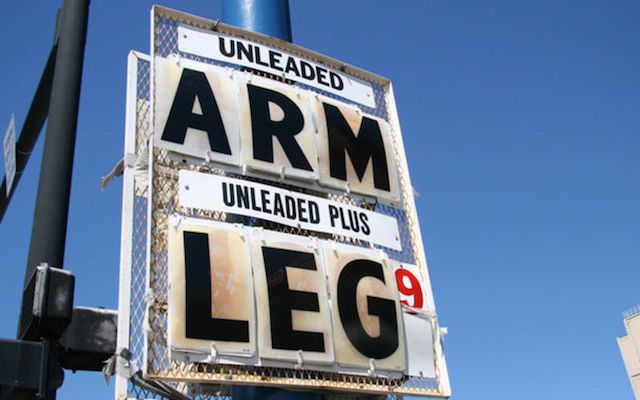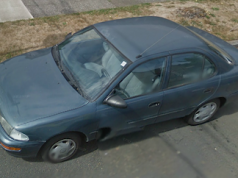
For years, we Americans have dealt with rising gas prices the way we’ve dealt with most of our other problems: by complaining, and doing nothing else. Until recently, this was sufficient. We’d grumble about the highway robbery at the gas pump, and that made us feel a little better as we continued to drive exactly as much as we had before.
It’s been a rather fascinating experiment in economics and human nature. How expensive would gas have to get before it actually began to affect people’s driving habits? Everyone thought it would happen at $2 a gallon. They thought $2 is where people would say, “OK, enough is enough, I am going to make a concerted effort to drive less!” But no. Two dollars came and went and the only thing that changed was the amount of complaining, which went up. So would it be $3 a gallon, then? Nope. Three dollars made people wistful and nostalgic for the good ol’ days when it was only $2, six months earlier, but the demand for gasoline did not go down. Four dollars, then? Yes! A-ha! Four dollars is the tipping point.
According to the Department of Transportation, Americans drove 1.4 billion fewer highway miles in April 2008 than we did in April 2007, and that was the sixth consecutive month of such declines. On top of that, sales of gas-guzzling SUVs are down 38 percent from last year, while sales of more fuel-efficient cars are way up. Furthermore, the failing economy and continued cutting of jobs have enabled some people to stop driving to work altogether. See? Everybody’s doing their part.
I’ve been lucky. The outrageous gas prices haven’t dramatically affected me because I mostly work from home. Mind you, this has not stopped me from complaining. Sometimes I have to drive 14 miles to a theater in the suburbs for a movie screening, which means I’m using a gallon of gasoline round-trip, and then sometimes the movie turns out to be something terrible like “27 Dresses.” I try to take a deep breath and remind myself that in poor, developing countries, people must travel hundreds of miles to see “27 Dresses,” and that they still have to pay for the movie tickets when they get there. But it’s hard to keep that kind of perspective at all times.
So why have gas prices risen so precipitously? It depends on whom you ask. The obvious culprits would be the oil companies; Exxon Mobil, the largest of them, made $40 billion in profits last year. And considering the Supreme Court recently reduced the company’s fine for the Valdez oil spill from $2.5 billion to just $500 million — or approximately 4 1/2 days’ worth of profits — you’d think they’d be sittin’ mighty pretty these days. But others will tell you that the oil companies aren’t actually doing all that well, and that the real cause of the problem is financial speculators. Speculation is involved in oil prices, and it is a mysterious practice that no one fully understands, not even me. I could tell you what I think speculation is, and what it has to do with oil prices, but I’d only be guessing. I’d be speculating on what speculation is. And that wouldn’t be beneficial to anyone. So I continue to blame the people I’ve always blamed for high gas prices: the gas station employees who actually put the numbers up on the signs. I hate all those guys.
When the topic of gas prices comes up in online discussions, smug people will often say smug things like, “You want to combat gas prices? Buy a bicycle.” Which is all well and good if you live within a couple miles of where you work, and if you work in a place where it’s OK to arrive dripping with sweat. For example, if you work at a gym, or a slaughterhouse. But those conditions don’t apply to most people, so the bike option is unrealistic.
Still, most people can reduce their gasoline usage at least a little bit without grossly inconveniencing themselves, and that’s what many Americans are doing now. It’s often simple things like this.
TIPS FOR REDUCING YOUR GASOLINE USAGE
1. Rather than making many short trips all over town to run your errands, consolidate them into one trip to Wal-Mart, and make your husband go, in his car.
2. Though it is annoying to have to wait for your car to warm up when you first start it in the morning, you should not get around that by just leaving it running overnight.
3. Public transportation is a great way to get around, especially if you like homeless people and being late.
4. Would it kill you to walk someplace every now and then, fatty?
5. Fill up a five-gallon container of gasoline now and keep it in your garage. That way, if inflation continues to rise, you’ll have it handy for when you need to set your house on fire and collect the insurance money.
6. Cars that run on garbage instead of gasoline, like in “Back to the Future,” have not been invented yet. Still, there’s no harm in trying it.
7. Driving less does result in less air pollution, fewer traffic accidents, and greater overall public health. But don’t worry: It’s OK to reduce your driving strictly to save money on gas, too, you selfish bastard.
8. Check around to find out which of your neighbors are carpooling to work. Then, find out which person isn’t driving that day, and take his car.
9. Men who drive Hummers are tools with inferiority complexes. I don’t have a gas-saving tip here; I just wanted to mention it.
10. The more people who reduce their driving, the fewer cars there are on the road — which will make it that much easier for those of us who aren’t poverty-stricken hippies to drive places.




